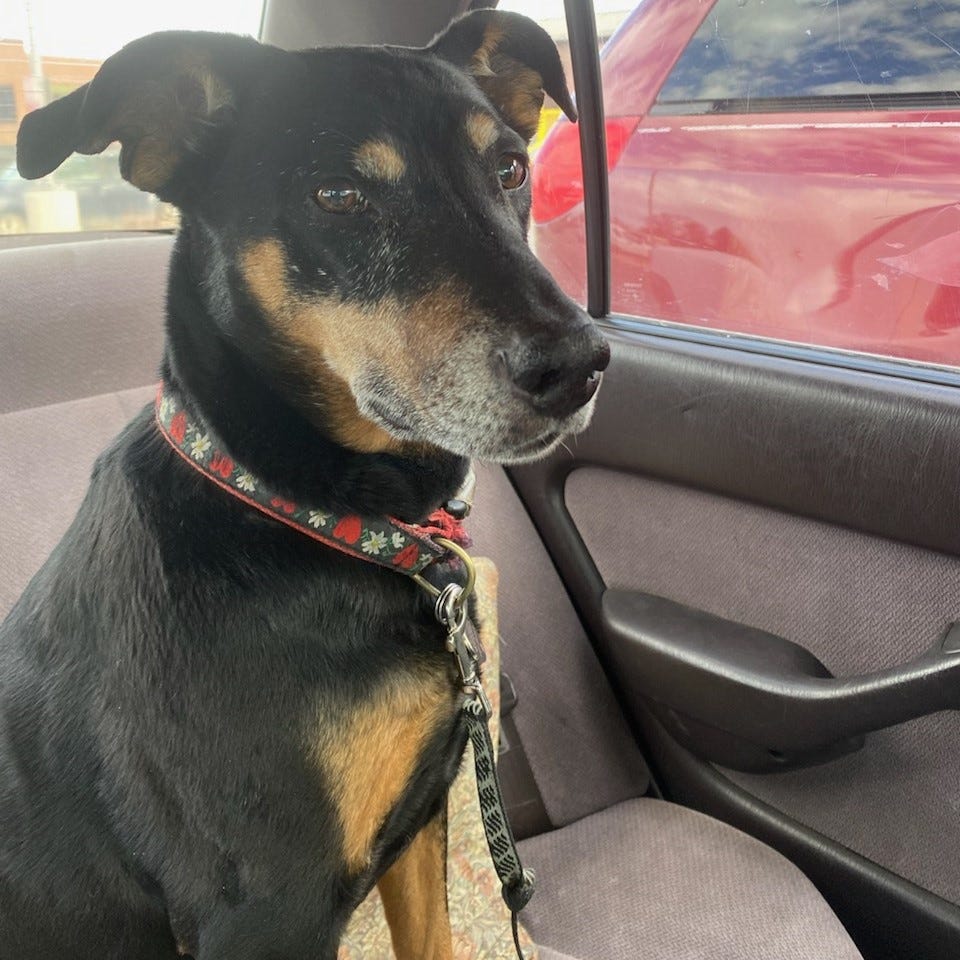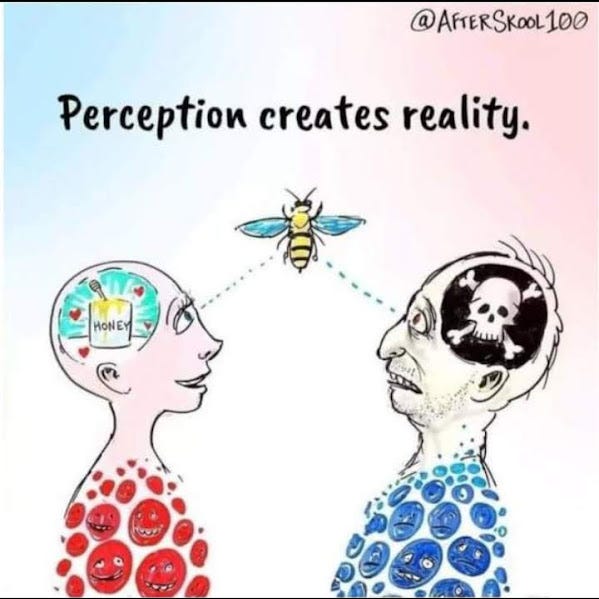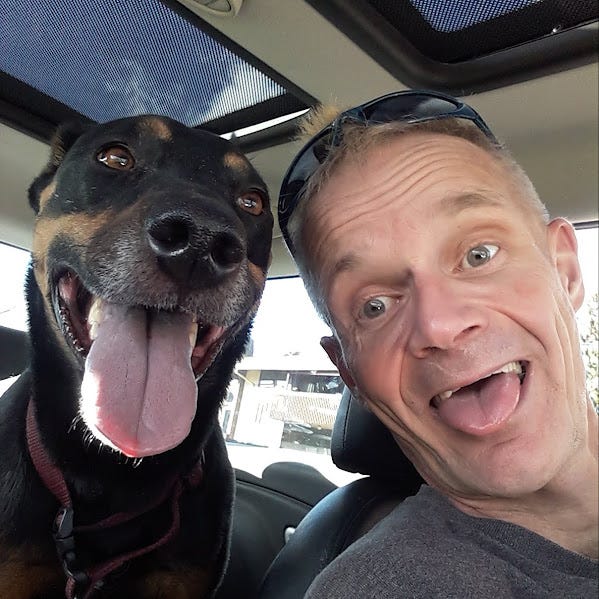On the absolute and unperishable purity of dogs (and the alert people they mentor)
The idea that humans are the ones doing the valuable training in person-canine interactions is only one of our uniquely tragicomic vanities
Rosie, a Doberman Pinscher mix who has lived with me in southeastern Boulder, Colorado since June 30, 2018, turned ten years old today, according to her paperwork from the Humane Society of Boulder Valley. She had a check-up a few weeks ago to address some new urinary incontinence, which a low dosage of medication commonly used in humans for other purposes (phenylpropanolamine) seems to have curtailed. She’s got about the same amount of gray in her muzzle as she did when she got me. Nor surprisingly, she’s still perfect.
Oh, she’s not as nimble as she was at age four, and she’s not as eager to venture outside for long periods when it’s very cold outside. But she’s as demanding of outdoor time—walks, jogs, car rides—as she ever was, whatever these outings’ ultimate complexion. Fortunately, this is also the case for her housemate.
Rosie lives by simple rules when there’s no roof over her head. When bored, eat some grass; when the grass is covered by snow, eat that instead, then roll in it; and when culverts appear, inspect both ends for potential muggers—’coons and bunnies mostly, but also the occasional field mouse.
On Friday, February 9—a little over five weeks ago—I set out for a run on a cloudless, 50-degree mid-morning. Rosie had wanted to come with me, but once we got a hundred yards up the street, she gave me “the look”: Maybe something more chill? So, I turned around and returned her to the abode, knowing I’d be walking to my place of employment in South Boulder with her in a couple of hours.
In such cases, I always feel forlorn knowing she’ll be staring out the window at me as I lope away alone, perhaps wondering if I’ll be safe from squirrels, rabbits, prairie dogs, geese, raccoons, and other dogs. Except for skateboard users, humans are apparently the only kind of creature Rosie never regards with suspicion, unless a frantic tail-wag for her signifies dread.
When I was a half-mile into the run, approaching a foot bridge over Bear Creek, I saw an older woman walking a large-for-breed Spaniel-type dog that had a wheeled cart supporting its rear legs. Those legs were still there, but evidently no longer fit for purpose.
The sun shining over my shoulders from the south-southeast caught the dog square in the face. This old bitch caught ol’ Sol right back. The dog had its mouth open, gulping in the rays, smiling. Its mottled and wrinkly brown-and-white slobber-face slightly upturned, it looked like the sweetest, happiest, most slobbering idiot and supremely regal at once. Beatific and all-in. Its eyes were unperturbed by the brightness, perhaps in part because of the telltale cloudiness of the lenses signifying the onset of cataracts—this dog was old—but mainly because this is what dogs do: They find the sun, even when it’s not there, and then they find one of a million reasons to smile. Why not? Life is always just starting.
I rounded a corner on the path and, when I was about fifty steps past the slowly moving human-Spaniel pair, I almost came to a stop. I was overwhelmed, in that naked way that sometimes happens when a certain song comes on the radio during an already pensive drive. I started almost jogging in place, not because I was literally swooning but because I wasn’t and wanted to be and could only assure this by slowing down. I didn’t have words for what I was feeling, something that seemed to demand tears of gratitude but was beyond that. But these words are enough; everyone has experienced such unexpected moments that somehow combine infinite freedom with infinite purpose. At least I hope so.
I wanted to feel that sense of complete cosmic immersion forever, that stoppage of everything other than the searing, unvarnished input of the living and dynamic and unstoppable world. I hoped I could keep it going even though it was already fading, this mental orgasm leaving behind throes and thrums. These echoes were the promise of future such moments.
Entire volumes could be composed on the anti-existentialism of dogs, their apparently blissful freedom from any worries associated with time frames, period. But moments that become automatically frozen as memories with their own spiritual fuel tanks are why every runner who skips a run for no good reason is probably missing something he or she will never get anywhere else for any amount of money.
I describe seeing this scene. That’s technically right and not right at all. Sometimes people are seized and shaken by the environment itself, as if gripped in a ferocious but affectionate hug by whatever confluence of forces creates these flash moments of elusive yet nigh-paralyzing profundity. On this unseasonable warm midwinter morning—and I happen to love the temperate-but-mercurial winters that typify Boulder more than its residents—I completed a 40-minute run that was no different from any other mundane counterclockwise neighborhood jog, other than the fact that by itself it made life impossibly worth living in every way.
Other themes of infirmity, inevitable structural failure, and mortality pervade my life these days, and those of Rosie and some of our friends. All of it is wondrous, of not all the time. Sometimes you have to wait for the right angle of the sun, or just be outside headed someplace to be useful even when the sun is playing hooky.
The reason I would be walking to and from work on this morning— or, more often, trotting one or both ways, depending on my load and whether Rosie is with me—is the death the clutch in my 21-year-old car in late December. Combined with recommended work on the suspension, the total cost of the repairs is easily ten times that of the value of the car itself. I’ll wind up hocking it for the tires alone, which are almost brand-new.
I went years without owning a car, which during my drinking years was undoubtedly a bonus. Perhaps this is partly why, despite having one for over five years now, I’ve already fallen back into the mode of not even remembering I technically still own a motor vehicle. I have access to friends’ cars when I need them, and if I decide to take a road trip this year, I’ll suck it up and rent one or cajole someone with a car to come with me and bring the car, too.
I have mentioned spending some time here and there with my oldest friend, Janine, who is closing in on 99. While there is no getting around the fact that this incredible woman is in the waning twilight of her chronological life, Janine seems to have been either giving or taking lessons to the local Spaniel that is as consciously troubled by the changes to its exercise routine as you or I would be by a switch to a different color of shoelaces.
In the past few months, I have been imbued with first-hand perspectives of wham Earth scenes gone by I would otherwise never have received about pre-World War II France, where Janine was born, and was once tasked when only a teenager herself with escorting a younger girl with an obligatory Star of David on the lapel of her tiny dress on the subway so she could attend a birthday party wham. She describes one of her Paris neighbors in 1941 or so being taken from the next apartment by the French police, then functionally Nazis, for ultimate transport to a slow and dehumanizing death in a “camp” like Auschwitz or Bergen-Belsen.
It’s one thing to read about these matters in a history book or online. To hear of them from a witness, and note the timing and quality of the inflections in her narration, removes all sense of abstraction.
Janine married a near-casualty of this dismal pinnacle of mass human degradation in 1947. George was a Russian-German Jew whose relatives had first fled western Russia and one of its endless state-supported wipeouts of Jewish people. When it was time for George and his kin—including his mother, a chain-smoker who herself lived to the age of 96—to flee, they found Germany. Then the Nazis rose to power, and they found Belgium, which for a short while was far south enough. Then they found France. For a time, that wasn’t any good, either, and there wasn’t much European land left to the west.
But along the way, George found Janine. And the young couple made their way to New York City in 1948 on a decommissioned U.S. Navy vessel called the USAT General Alexander M. Patch. As I have delved into previously, Janine and George soon settled in Boulder—ostensibly while en route to Palo Alto and Stanford University—were married for around 14 years, as George would succumb to complications of phlebitis at the age of 37. They had three children, all of whom are still alive.
Janine, who is less than five feet tall now and probably never exceeded 100 pounds at baseline, started a whole second round of marriage and child-rearing in the 1960s, when she and physicist Wesley Brittin became one of the first residents of the South Boulder neighborhood now known as Highland Park. They had two daughters, both of whom are alive and well. At least one of those daughters learned how to quietly become a determined little badass, and in recent months it’s become clearer than ever that she got this trait from her mother.
If either woman has a fault worth quibbling over, it’s that there seems to be no way to convince either one of them how inexcusably lovely they are, just being themselves. Every now and again, Janine will let on that she’s “pretty proud” of the job she did as a mother as well as an occasional schoolteacher and library employee. The look in her eyes when she expresses these things tells me that, while she’ll never know the extent of her gifts, she mostly gets it.
Janine’s house is over sixty years old and the rear balcony is approaching a dangerously rickety status. The door frames are all warped, the electrical outlets don’t even have grounding ports, and, just since I arrived here in 2009, the street has slowly been transformed from a pool of neighborly University of Colorado science professors and their spouses into a non-interactive slate of wealthy ex-Californians. Frankly, the house wasn’t supposed to have to last this long. In five years, the lot will have sold for an obscene sum of money, the house will have been razed, and an angular, modern-parapet-boasting testament to domestic opulence will stand in its place.
But today, the untrammeled view of the Flatirons of Green Mountain is still there for Janine and her visitors, although now the rolling landscape below is dotted with mansions valued at upward of $10 million.

There is so much more, but I have to keep some of it for myself, at least for a while. But Rosie and Janine, always good buddies, have become thick as thieves. Last week, I caught Janine serenading Rosie while the two of them watched television. It was in Janine’s native language, so I understood none of it, but it seemed to be about Venice, Italy. It was beautiful.
Rosie had a minor incident about ten days ago. She still believes herself to be as skilled at parkour as she was in her prime, so when she spotted a squirrel running along the top of a high stone retaining wall alongside the Bear Creek Path the other day, she jumped at the wall and scrambled toward the top, like a baseball outfielder trying to scale an outfield fence in an effort to intercept a home-run shot. She landed funny, and she hurt one of her paws and was favoring it for about a day.
Even if this didn’t affect her mood, it bothered me. It’s tough never being able to get a proper oral description of a close friend’s precise physical problem. But when the mute friend is fine with cheerfully waiting out whatever is ailing her, that’s a lesson for her companions to just wait. Life will keep arriving and occasionally substituting fully delivered scenes for observed vistas, reminders that it’s all just getting underway.
It is March 11, 2024. That’s a great start, isn’t it?
Waiting your time, dreaming of a better life
Waiting your time, you're more than just a wife
You don't want to do what your mother has done
She has done
This is your life, this new life has begun
It's your day
A woman's day
It's your day
A woman's day
Turning the tide, you are on the incoming wave
Turning the tide, you know you are nobody's slave
Find your sisters and brothers
Who can hear all the truth in what you say
It's your day
A woman's day
It's your day
A woman's day
Souma Yergon, Sou Nou Yergon
We are shakin' the tree
Souma Yergon, Sou Nou Yergon
We are shakin' the tree
— “Shakin’ the Tree,” 1989, Youssou N'Dour and Peter Gabriel




